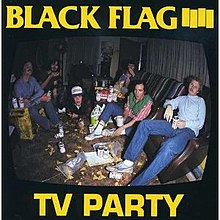TV Party (EP)
| TV Party | ||||
|---|---|---|---|---|
 |
||||
| EP by Black Flag | ||||
| Released | July 12, 1982 | |||
| Recorded | March 1982 | |||
| Genre | Hardcore punk | |||
| Length | 6:49 | |||
| Label | SST | |||
| Producer |
|
|||
| Black Flag chronology | ||||
|
||||
TV Party is an EP recorded by the American band Black Flag in 1982. It was produced by Black Flag and Ed Barton and originally released by SST Records on the 7" vinyl format. The EP contains three songs written by guitarist Greg Ginn: "TV Party", "I've Got to Run" and "My Rules". The title track "TV Party" is a satire of boredom, drinking and America's obsession with television.
Reception to the EP focused heavily on the title song "TV Party", where it was praised as one of the group's funniest and best songs. The original version of the song was released on the band's 1981 album Damaged.
The song "TV Party" was recorded three times. To promote the Damaged album in the United States, Unicorn Records had Black Flag enter the studio and re-record the song for the EP in March 1982, with their then-new drummer Emil Johnson. The EP version features a slower tempo and hand claps. The band again recorded the song at the request of Alex Cox, for his 1984 cult classic film Repo Man and the accompanying soundtrack. Each version of the song lyrically references different TV shows from the era in which each recording was made.
"TV Party" is driven by Chuck Dukowski's bass line and features Henry Rollins on lead vocals and bellowed backing vocals from band members. The song is light in comparison to other songs from the band's Damaged era. Black Flag guitarist Greg Ginn has stated that after "Rollins joined the band, we couldn't do songs with a sense of humor anymore; he got into the serious way-out poet thing." Rollins described the song as satire, stating "it's about people who stay inside their house and live in a TV kinda world. And this has a very direct effect on us." Ginn echoed Rollins's interpretation, stating "It's basically a satire of people watching TV and partying at home, which is a sickness which is very prevalent in LA."Glen E. Friedman referred to the song as "a parody of certain type of people". Comparing the song to the Beastie Boys' "(You Gotta) Fight for Your Right (To Party!)", he stated "They were both parodies that people took too seriously, and even the bands were found taking themselves too seriously after the fact."
...
Wikipedia
